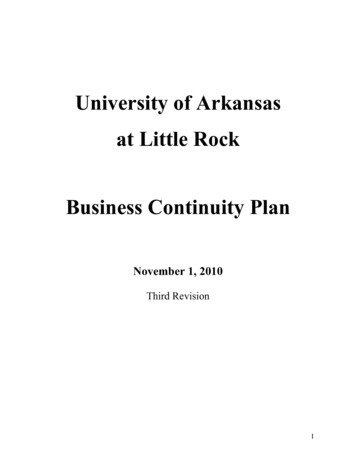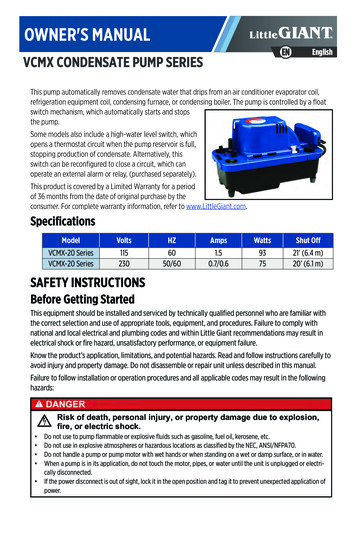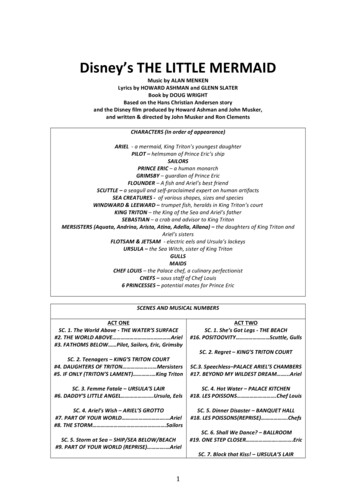
Transcription
Building the next business generationLittle book ofbusiness skillswww.macmillanenglish.com/TheBusiness2.0
INTRODUCTIONWelcome to The little Book of Business SkillsWe’ve prepared this small snapshot of the business skills which employers look for. We hopeyou’ll enjoy reading it and trying out some of the lessons from The Business 2.0 which illustratethe skills included. There are full links to downloadable full sample units and their related audioonline so that you can show your students first-hand how these skills can be learned.ContentsThe secret skillBusiness SkillsCommunication skillsCommunication skills activitiesNegotiation and persuasion skillsFinancial and numeracy skillsTechnological skills (IT)Technological skills (IT) activitiesOrganisational skillsSelling skillsLeadership and team skillsProblem-solving and decision-making skillsAbout The Business 2.0Resources for business EnglishPage 3Page 4Page 5Page 6Page 7Page 8Page 9Page 10Page 11Page 12Page 13Page 14Page 15Building the next business generationYour feedback, research into business English studies and the evolving needs of employers havehelped us to update our popular business English course for college and university students.The Business 2.0 builds on the success of the first edition and includes a range of new materialwhich offers students the language, skills and confidence they need to succeed in thecompetitive international business s Audio CDsTeacher’s Book andTeacher’s Resource DisceWorkbookStudent’s BookAll compactly packaged in a format to suit you, the extensive range of resources is available ineasy-to-use formats, for teachers and students. See the back of this booklet for the full range ofcomponents as well as their ISBNs for easy ordering.
The best professionals are those with emotional intelligence‘Interpersonal skills’ – ‘Emotional intelligence’ – ‘The vital5th skill’ – ‘The hidden or secret skills’ .Why do we need them in business?Whatever you choose to call them, they are that extra littlebit of something that helps you get along in a professionalenvironment and makes other people say: ‘I really like workingwith her/him’ and makes employers think: ‘I want them onmy team.’When we’re teaching students English language and businessskills, there’s still room to ensure that they also get exposure andpractice in these other vital areas relating to interpersonal skills.What’s your ‘Secret Skill’? competition resultsOur competition from a recent BESIG showed that business teachers worldwide are fully aware ofthese ‘secret skills’, and sent in some fantastic examples of their own.Here are the winning entries from Anne-Marie Ross and Cristiano Caetano along with aselection of other great entries (some of which have been annotated). Congratulations toAnne-Marie and Cristiano and thank you and well done to everyone who entered!“Learn everyone’s name – from the CEO to the cleaner – and use them!”Anne-Marie Ross“Listen to everyone from the cleaner to people in top management, becauseyou may get brilliant ideas for the business from anyone in the company.”Cristiano Caetano“Always respect people as individuals but make them work as a team.”Hana Nesutova, Czech Republic“Showing my students that it’s okay to make mistakes by making mistakesmyself and correcting them.”Carlos Martinez, Germany“Being ready to learn – always and everywhere. I don’t have all the answers andcan learn something from every interaction, from everyone, and every situation.I know a little more each day and am open to new things.”Cait Kinsella, Germany3
BUSINESS SKILLS1. Communication skills (speaking and writing)In the world of business, no one can deny that good communication is key. Whether you arespeaking or writing, presenting or producing copy for products, there’s no escaping the fact thatto do business well, you need to communicate well.So what do we mean when we say that someone has ‘excellentcommunication skills’?Excellent communicators are confident. They give clear messages when they speak and write.They use the right words for the right occasion, and pronounce them clearly. They understandand use non-verbal communication, such as body language, and they maintain appropriateeye-contact.Communication is two-way, so good communicators need to be able to listen well, be awareof and sensitive to other people’s feelings as well as check with the listener that they have beenproperly understood.Some managers may be natural communicators. Others may need to work harder at this inorder to consciously develop their skills in this area. It is quite common to find managers who aregood at verbal communication, but who are not so good at written communication. Conversely,some people who are strong on paper may dread giving presentations. It is certainly possible formanagers to strengthen their skills in this important area through reading about communicationskills, training or by practising these skills every day in the workplace.Articulate verbal language skills and superior written communication abilities are the crucialelements which are transferable across disciplines, but can be particularly relevant in business.What is covered by communication skills?Use the table and tick those you think are relevant for speaking or writing, or both. Can you thinkof any more that are used in a business environment?SpeakingKnowing when to use the right tone or level of formality for the right situationxxxxxCreating PR, marketing plans and promotion for products or servicesxxxxxGiving presentations and training to improve team-buildingxxxxxCommunicating face-to-face, online, by phone or in writing with colleagues, customers,employees, investors, suppliers and othersPublic speaking to shareholders, clients or customers and sharing your product, business ideaor visionEffective networking with internal and external partners to build new business relationshipsand contactsWriting formal or informal emails to colleagues, customers and suppliersxxxxxNegotiating with colleagues or clients in order to get the best dealIntercultural 2.0xWriting
Communication skills activities from The Business 2.0Try this activity from The Business 2.0 new Pre-intermediate level, Unit 1 Gaining experience withyour students.Meeting people and making conversation - Lesson 1.4 SpeakingIt is not easy to network effectively. Building new business relationships can start at a networkingevent. In Exercise 4, you can find a list of useful expressions for making conversation, includingphrases for changing the subject, keeping the conversation going and finishing a conversation.Download the audio file, and listen to the phrases to help you practise further.Extract from The Business 2.0 Pre-intermediate Student’s Book, page 16Try this activity from The Business 2.0 Intermediate, Unit 3 Products and packaging withyour students.Writing a product description - Lesson 3.5Writing is sometimes seen as the most difficult of the four language skills, but why is this?One reason is the fact that business writing has to be accurate. In Exercise 6, studentspractise writing a product description for a tablet PC, using a set of notes.Using notes means that the content has already been brainstormed, and allows the writer toconcentrate on accuracy.Download sample units and audio for The Business 2.0 Pre-intermediate and Intermediate levels 5
BUSINESS SKILLS2. Negotiation and persuasion skillsThe term ‘negotiating’ can cover anything from a hard team negotiation for better terms in acontract, to simple everyday situations, such as discussing the best place to have lunch. At sometime or another, every manager needs to persuade an employee or a customer to change theirmind about something. Some find negotiating and persuading difficult skills to master. But whatdo these two skills involve?When negotiating, you must do the following: prepare well; establish mutual trust; listencarefully to the other team; and keep a ‘win-win’ outcome in mind.An established technique is to form three positions in your head: What you could get away with in an ideal world, which is usually your opening bid What you expect to get, based on prior knowledge of your market Your ‘deal breakers’ – something which would make you walk away from the negotiating tableWhen it comes to persuasion, some people seem to just win you over using their natural charm.But there’s far more to persuading people than this. You can: Frame your persuasive argument by selecting certain words that bring up particular imagesin the mind of the listeners Mirror the listener’s body language, in order to achieve a sense of empathy Do something nice for someone first, so they might feel the need to return the favour Make something seem more appealing because there is limited availability; this is called‘scarcity’ in people marketingThe manager gifted in persuasion may well use their ‘special skill’ to get others to do what theywant them to do. That’s a useful business skill for any manager, negotiator or sales rep!The Business 2.0 can help you with negotiation skills. In every unit there is a focus on languagestructures, such as conditionals. Good use of conditional forms are vital to successful negotiations.For example, do you know the difference between: “If we give in on this point, we’ll have a deal”and “If we gave in on this point, we’d have a deal”?Try this activity from The Business 2.0 Advanced, Unit 7 Investment.Grammar: Inversion and emphasis - Lesson 7.3Exercise 2 on inverted conditionals enables students to use the conditional forms more flexiblyat advanced level. It is followed by an exercise on ‘reformulating for emphasis’, a technique whichcan help successful negotiating. This unit finishes with a full-blown negotiation so students canpractise these techniques.Download the sample unit and audio for The Business 2.0 Advanced level 6www.macmillanenglish.com/TheBusiness2.0
3. Financial and numeracy skillsBusiness is about making money, and whether you love or hate maths, financial skills andunderstanding numbers (i.e. numeracy) are both vital skills to have in order to succeed.So, what do we mean by financial skills? In terms of the big picture, this could involve: Understanding profit and lossReading financial reportsBudgeting and knowing how to manage cash flowSpending – knowing how to spend and invest money wiselyTracking the time you spend on a projectUnderstanding the ‘cost-benefit’ ratioAre you someone who is good with numbers? How numerate are you? In business, it’s useful tobe able to do the following: quickly work with figures in your head, make rough but fairlyaccurate estimates, and read sales reports easily. Certainly, at the end of the day you could hirean accountant. But to succeed in the business world, being able to apply accountancy principlesto all aspects of running a business will be invaluable.We may love spending money, but there’s a difference between wasting money and knowinghow to spend and invest it wisely. Making wise investment decisions is not always easy, evenfor professionals. Test your investment skills and try this activity from The Business 2.0Advanced, Unit 7 Investment.About business: Investment banks - Lesson 7.2The first discussion exercise provides students with a chance to discuss how they wouldinvest 50,000.Try this activity from The Business 2.0 Pre-intermediate, Unit 1 Gaining experience.Vocabulary: Personal details - Lesson 1.2We tend to count in our first language, and it takes students a lot of practice until they can feelconfident using complex numbers in English. The Business 2.0 contains a series of exerciseswhich help students build up their confidence in using numbers.Extract from The Business 2.0 Pre-intermediate Student’s Book, page 12Download sample units and audio for The Business 2.0 Pre-intermediate and Advanced levels 7
BUSINESS SKILLS4. Technological skills (IT)No one in business today can afford to ignore the technology revolution going on around them.The whole nature of doing business has changed almost beyond recognition, due to the growthof IT systems, the rise in the use of the computer and the spread of the internet.ICT or IT lies at the heart of running a business in the 21st century, and has provided us with newways to communicate with clients and employees.Doing business is becoming increasingly international, so managers today may find themselveshosting a ‘virtual meeting’ with members of their team, or with important clients, spread acrossthe globe.When it comes to IT skills, it’s important not to feel left behind. Just what this skill of ‘technology’involves is quite broad, but it may involve some or all of the following: Knowing something about your own company website, and what makes it an effectiveshop window for the firm Using business software to track your own goods through the supply chain, or generatebusiness plans Using spreadsheets Using a client database or CRM (Customer Relationship Management) system Using PowerPoint or learning Prezi, a new type of tool, to deliver great presentations Keeping on top of social media – being able to write a blog, for instance – and knowing howsocial media can grow your business – or the reverse Managing the flood of emails which greet you every morning, and understandingemail etiquette Understanding cyber-risks – keeping your hardware safe through use of securityThere are several different video-conferencing platforms used in today’s business environment,although they work in similar ways. Managers who communicate online quickly learn therelevant technology skills, such as sharing their desktop screen, asking participants to turn theirvideo cameras on or off, and chairing an online discus
Welcome to The little Book of Business Skills We’ve prepared this small snapshot of the business skills which employers look for. We hope you’ll enjoy reading it and trying out some of the lessons from The Business 2.0 which illustrate the skills included. There are full links to downloadable full sample units and their related audio online so that you can show your students rst-hand .











